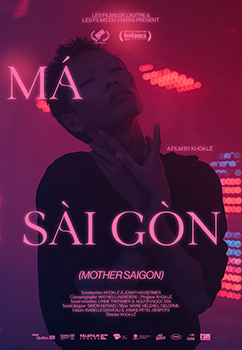Má Sài Gòn (Mother Saigon)
Review by Maurie Alioff – Québec Correspondent
(May 24, 2023 -Montréal, QC) Like all documentary festivals, Hot Docs 2023 was loaded with issue films ranging from climate change to the treatment of the elderly and sick to the slow rollout and marketing of Black Barbie dolls to hostility directed against LGBTQ+ people. But unlike television reportage, a film needs be about more than an issue. Festivals like Hot Docs are important for showcasing movies that present an issue with narrative drive and often innovative aesthetics.
 A case in point is Khoa Lê’s Má Sài Gòn (Mother Saigon). Lê has emphasized in interviews and a Q&A that reflecting his personal POV and following his drive for experimentation are as important to him as thematic content. Mother Saigon fuses observation of LGBTQ people the Vietnamese-Canadian befriended in Ho Chi Minh City, still known as Saigon to people who live there, with a dreaminess that recalls the visionary work of Hong moviemaker Wong Kar-wai.
A case in point is Khoa Lê’s Má Sài Gòn (Mother Saigon). Lê has emphasized in interviews and a Q&A that reflecting his personal POV and following his drive for experimentation are as important to him as thematic content. Mother Saigon fuses observation of LGBTQ people the Vietnamese-Canadian befriended in Ho Chi Minh City, still known as Saigon to people who live there, with a dreaminess that recalls the visionary work of Hong moviemaker Wong Kar-wai.
Mother Saigon opens on an extended dialogue between two trans people, one of them advising the other on jewelry, hairstyle, and other appearance issues. One, hair cropped short, wears a long red gown and long strands of apparent pearls; the advisor has long hair, bangs, and is in a short skirt and sandals. Her legs are noticeably masculine.
The scene establishes Lê’s approach. The characters in the movie don’t do straight-to-camera and no polemics. They talk to each other or other people in their lives as the film cross-cuts from one individual or couple to another: a duo in Mickey Mouse T-shirts, an older woman and her young lover who would like to have a child, people taking selfies, a drag queen who performs. They gossip, discuss their personal and societal problems, talk about fashion. Often they are concerned about traditional family, which they value and want to be at peace with. One character says, “They think we are monsters.”
 Meanwhile, the doc works as a city film taking the viewer through buzzing streets, marketplaces, rooftops, and apartments. When characters are not chatting nonstop, they are often preparing food, cooking, and eating. In one scene, the camera lingers on a young man meticulously slicing and eating a grapefruit.
Meanwhile, the doc works as a city film taking the viewer through buzzing streets, marketplaces, rooftops, and apartments. When characters are not chatting nonstop, they are often preparing food, cooking, and eating. In one scene, the camera lingers on a young man meticulously slicing and eating a grapefruit.
For Lê, who lives in Montreal but visits Vietnam often, Saigon is a vibrant, colourful, endlessly fascinating place. He intends his movie to be an ode to the city. In one scene, a gay couple talks marriage while floating on a swan-shaped pedal boat. In Saigon’s bars and nightclubs at night, Lê creates a dreamscape of vibrating sound and colour. When a viewer at the Q&A asked him how he strategized the shifts between observational doc and dream movie, Lê answered that he didn’t. He just followed his instinct; the transitions between daily life and nocturnal dreaminess are the way life works.
Mother Saigon builds to sweet moments between loving families and their convention-breaking children. One mom is delighted by her drag queen child’s performance. The finale also goes completely psychedelic in a phantasmagoric montage highlighting showgirls, cut to a pounding disco beat and an ironic trance chant: “Shitty, shitty faggot.”
Mother Saigon transports the viewer into worlds within worlds.
Images courtesy of Films de l’Autre-F3M
![]() Maurie Alioff is a film journalist, critic, screenwriter and media columnist. He has written for radio and television and taught screenwriting at Montreal’s Vanier College. A former editor for Cinema Canada and Take One, as well as other magazines, he is affiliated with the Quebec media industry publication, CTVM.Info. His articles have appeared in various publications, including Canadian Cinematographer, POV Magazine, and The New York Times. He is the Québec Correspondent for northernstars.ca
Maurie Alioff is a film journalist, critic, screenwriter and media columnist. He has written for radio and television and taught screenwriting at Montreal’s Vanier College. A former editor for Cinema Canada and Take One, as well as other magazines, he is affiliated with the Quebec media industry publication, CTVM.Info. His articles have appeared in various publications, including Canadian Cinematographer, POV Magazine, and The New York Times. He is the Québec Correspondent for northernstars.ca


